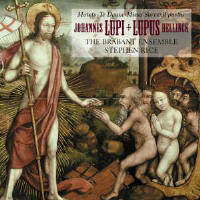Texte paru dans: / Appeared in: |
|
|
Appréciation d'ensemble / Overall evaluation :
|
|
|
Reviewer: Paul
Riley
What's in a name? The Brabant Ensemble's latest foray into the world of 16th-century polyphony sets its satnav to the Low Countries and two composers eligible for membership of - to quote director Stephen Rice - 'the so-called wolf pack': musicians whose name fingers Lupus, the Latin for wolf. Alonso or Duarte Lobo might have offered better known Iberian prospects; but true to their appellation, the Brabants have a penchant for northern climes (and the under-championed). Step forward, therefore, the predominantly Bruges-based Lupus Hellinck, and Johannes Lupi who, after studies in Leuven, returned to Cambrais where he served out his sadly foreshortened days as the Cathedral's maître de la chapelle.
The main work is one of three Masses to push the envelope by adding an extra voice to Hellincks customary four-part preference while, a Te Deum aside, Lupi is represented by a clutch of motets including an arresting eight-part Salve celeberrima virgo. This latter receives a consummately-crafted reading, its tangy ‘false relations' never exaggerated or attention-seeking. The Mass, too, opens with a poised precision, every note suspended within a texture quietly reverential rather than overtly emotional. The leave-taking of the Agnus Dei is deeply affecting, and the euphonious swirling of the Osanna enchants.
Over the course
of the disc, however, a certain expressive uniformity prevails, and the sensual
implorations of Quam pulchra es, a motet inhabiting the sultry world of
the Song of Songs, eschew any hint of ardour.
| |
|
|
|
|
|
|
|
Cliquez l'un ou l'autre
bouton pour découvrir bien d'autres critiques de CD |
|




